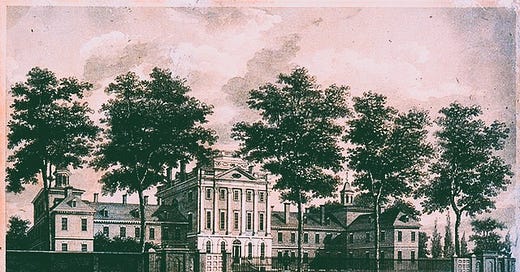May 11, 1751: Pennsylvania Hospital
One of the earliest established public hospitals is founded.

The development of America often happened in a rapid fashion that saw community leaders and prominent members of society take a leading role in the institution of civic life, health care needs, and community development. Benjamin Franklin famously helped build Philadelphia, Pennsylvania into a colonial hub of culture, political expression, and services. The building and sustainability of the Pennsylvania Hospital, beginning in 1751, is a testament to the roots many colonial Americans had laid in the century leading up to the Revolutionary War. However, it is also an example of America’s contributions to the idea of public spaces and how we turn our back on that legacy in the present day.
The Pennsylvania Hospital was given matching funds by the state legislature but was also endowed by Franklin himself and members of the Stretch family (Isaac, Thomas, and Joseph). He was aided by Dr. Thomas Bond, who also offered lessons and medical services. This hospital is a beautiful work of art and a National Landmark featuring a surgical amphitheater that was operational from 1804 to 1868. The amphitheater aided classes of future surgeons in observing and learning.
The hospital also specialized in maternal health care, as standards continued to improve as attitudes towards women improved. The first class of women students attending the hospital were met with hisses and insults. The hospital is also known for its extensive medical library that offers approximately 30,000 volumes of research and recorded discoveries open to practicing physicians for exploration. With this is an in-house garden featuring herbs and medicinal properties which was completed for the bicentennial as it had been an idea for the medical center since 1774.
Today, Pennsylvania Hospital is a part of the larger University of Pennsylvania medical system in 1997. It is the largest private employer in Philadelphia. Some of the edifice is still in its original location. It is also still a teaching hospital. On May 9, 2023, Penn Medicine hospital staff successfully voted to unionize, which would create the first house staff union in Pennsylvania. The collective response on the part of health staff is to appeal to management forces for better work standards, more transparency, and more efforts to see patients as humans and not dollar signs. This is not happening in a vacuum. The outcome of the COVID-19 pandemic revealed the underlying inequities and log jams that mire modern healthcare in America. Hospital employees are often undervalued and pushed to their breaking point despite holding essential roles in a developed society. The GOP’s attempts to kill the Affordable Care Act and further wed people’s health chances to their employment status also sends a signal to the public that Republicans support an unhealthy society as long as it doesn’t impact their segment of the world. This attitude is an excessive outgrowth of a political cult and national political culture that has grown disdainful of public spaces in recent memory.
When the nation was founded, public spaces had to be formed. This means fire brigades, educational facilities, opportunities for community recreation, and yes, public health. The aggressive push to privatize spaces and services is diametrically opposed to the nation-building character that developed and colonized societies. It also sheds conservatives’ fears and condescension towards a diverse and freedom loving public.
Yes, the American public has become more diverse in ethnicity, traditions, and thought. But that is not a reason to stop funding the nation’s public spaces and health infrastructure, especially when the rationale stem from generational propaganda stating that a person without advantages and networks also deserves medical bills that can ruin them financially (because they didn’t work hard enough).
People with cushy jobs don’t necessarily work harder than other people.
In fact, many were just in the right place at the right time and fortunate to be surrounded by positive social pressures to offset negative ones. So, our healthcare system also needs to reflect the humanity of the entire public square, not just a privileged few.






